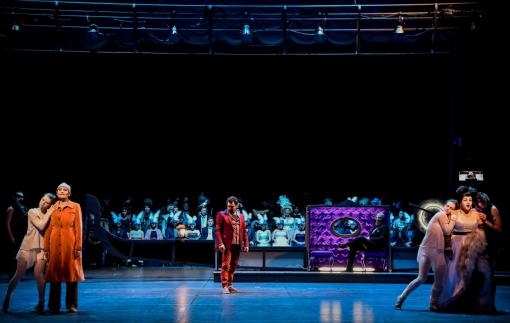The motto of the 2019/20 operatic season is the Searching… Already the very first premiere is dedicated to the theme of the search for love. The Tales of Hoffmann by Jacque Offenbach are being prepared by the duo of directors SKUTR (which stands for Martin Kukučka and Lukáš Trpišovský). This opera returns to the stage of the Janáček Theatre after almost twenty years, this time in a musical production by Ondrej Olos. The main roles will be performed by soloists of Janáček Opera of the National Theatre Brno, and regular guests of the ensemble will also appear. The leading female roles will feature, for example, Markéta Cukrová, Slovak soprano Martina Masaryková, Pavla Vykopalová and Daniela Straková-Šedrlová. The male parts will be performed by Luciano Mastro and Mickael Spadaccinni, or, for example, Ondrej Mráz and Jiří Sulženko.
The Tales of Hoffmann, written by the French composer Jacques Offenbach, are returning back to the stage of the Janáček Theatre after almost twenty years. Two directors, Martin Kukučka and Lukáš Trpišovský, who are known on the Czech theatrical scene under the acronym SKUTR, have been invited to undertake the production. They already presented themselves to the Brno audiences with their production of Liška Bystrouška [The Cunning Little Vixen] by Rudolf Těsnohlídek, and Radúz and Mahulena on the National Theatre Brno's drama stage several years ago, and now they are in for their first cooperation with the opera ensemble. The leading roles will be performed by Luciano Mastro and Mickael Spadaccinni in the role of the poet Hoffmann, and Ondrej Mráz and Jiří Sulženko in the quadruple bass role of Lindorf/Miracle/Dapertutto/Coppélius. The leading female roles will be performed by Markéta Cukrová (Nicklausse & La Muse), Slovak soprano Martina Masaryková (Olympia), Pavla Vykopalová (Antonia) and Daniela Straková-Šedrlová (Giulietta). The premiere is announced to take place on 20 September at 19:00 at the Janáček Theatre.
The works of Jacque Offenbach are associated above all with the so-called "light muse", but despite all the success he achieved with his operettas, the composer tried throughout his whole life to prove that he also had a place among his contemporaries, recognized composers of classical music such as Gounod, Meyerbeer, Massenet and others. At the end of his life, when his artistic fame began to fade not for artistic reasons, but because of his Jewish origin, he tried to conquer the gates of opera theatres for one last time. As a theme he chose the play of Messrs Jules Barnier and Michel Carré, who also belonged to well-known authors of operatic librettos. The play was called The Tales of Hoffmann and its main character was a historical figure, a German romantic poet and composer E. T. A. Hoffmann. Three short stories written by this poet, Der Sand Mann [The Sandman] (Olympia), Rath Krespel [Councillor Krespel] (Antonia) and Die Abendteuer der Sylvestre-Nacht [The Adventures of New Year's Eve] (Giulietta) became the basis of the story. Offenbach did not eventually complete his desired opera, leaving behind the finished framework of the opera in the form of a prologue and epilogue and the conduct of Olympia and Antony. Offenbach himself did not deny his world of operetta in The Tales of Hoffmann, but extensive lyrical numbers and sophisticated dramatic passages rank this work alongside authors such as Gounod and Bizet. The opera was later completed by the composer Ernest Guiraud, but the version played at its premiere on 10 February 1881 was far from definitive. During the 20th century, a number of fragments of Offenbach's manuscript were found in his inheritance and several editions were released to reconstruct the possible shape of the opera.












No comment added yet..